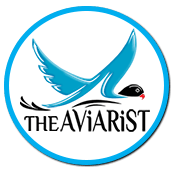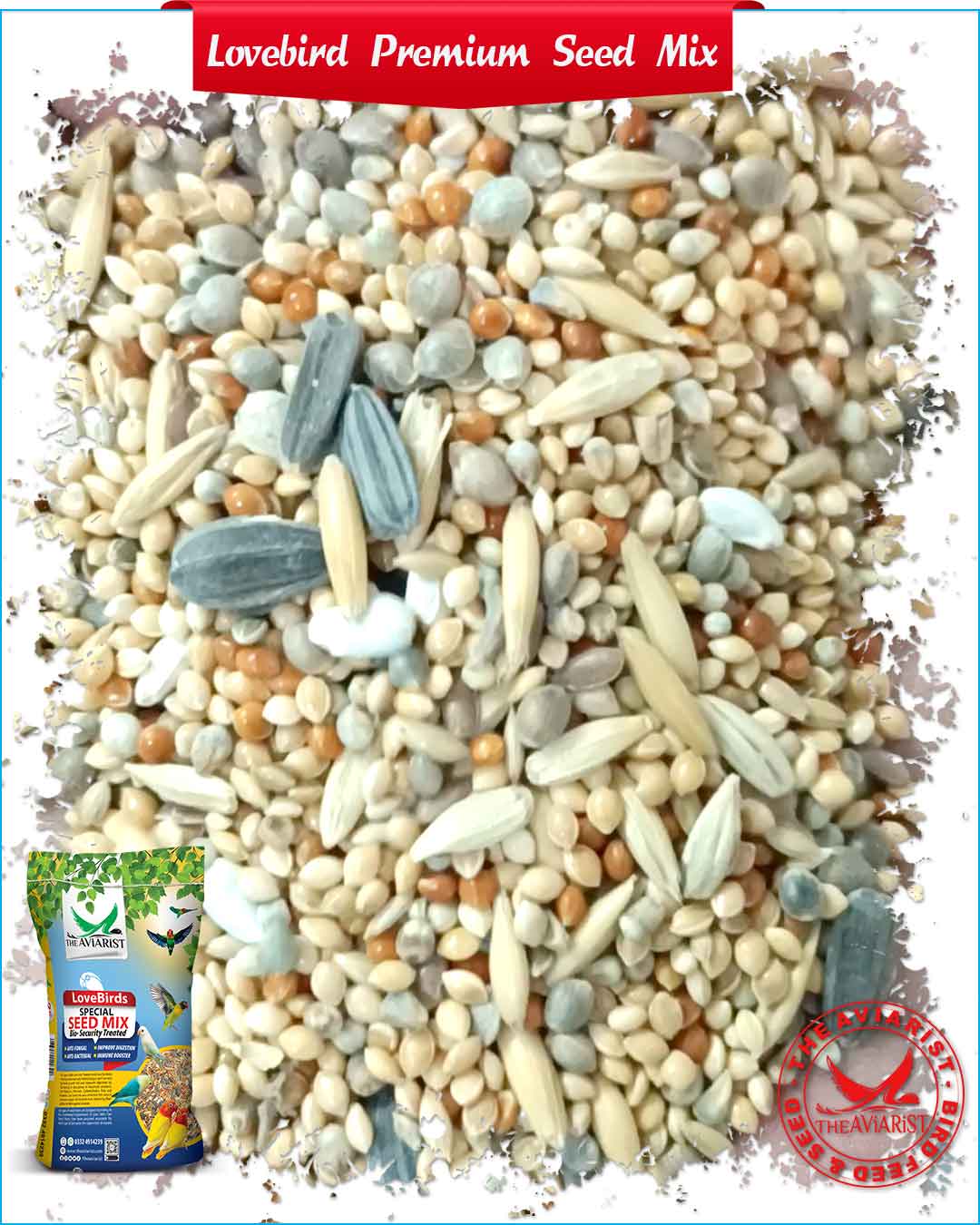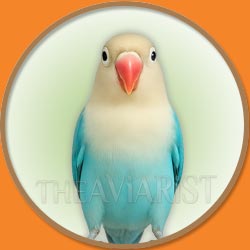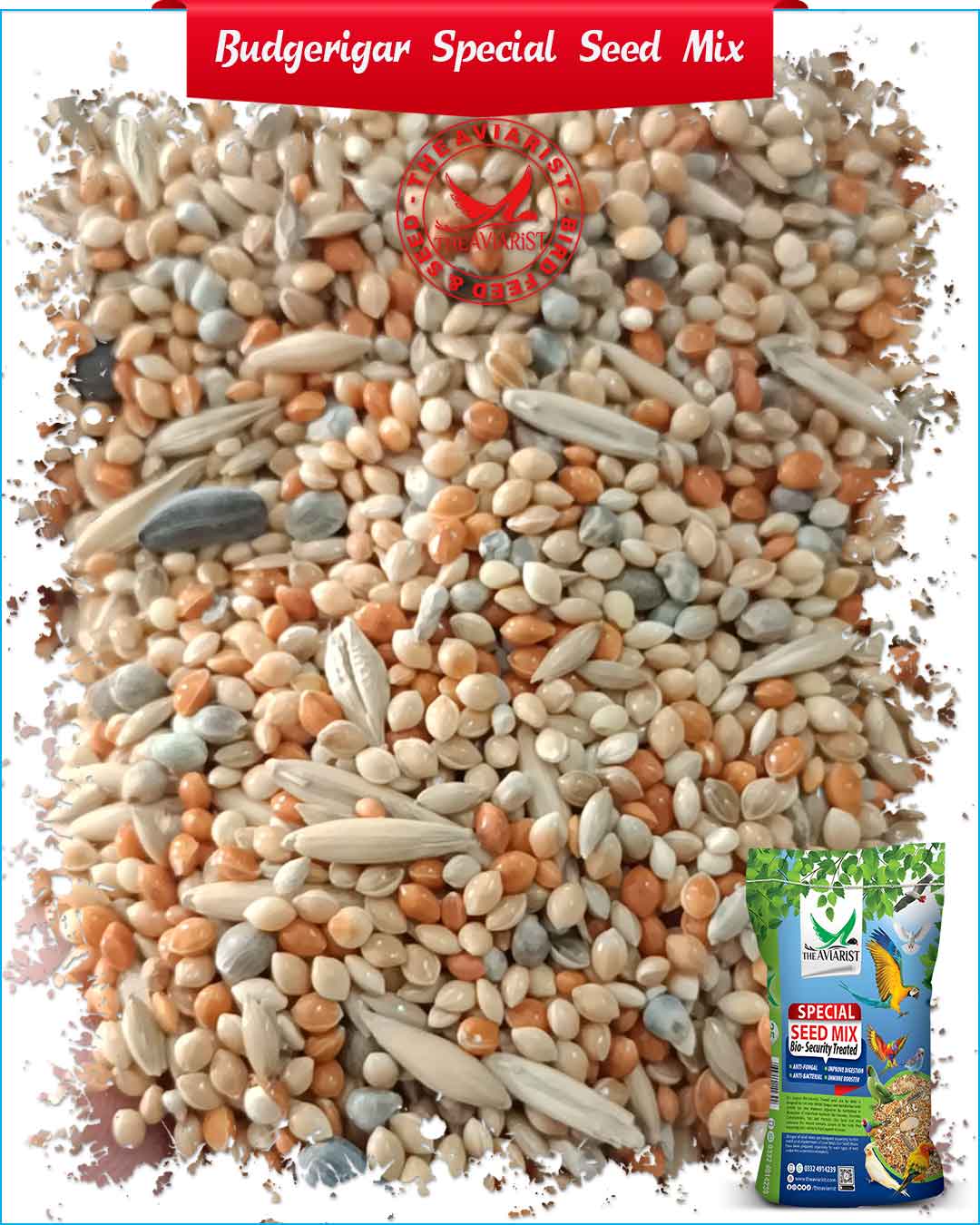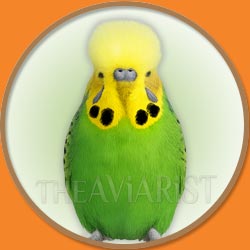Sun Conure

The Sun Conure (Aratinga solstitialis), also known as the Sun Parakeet, is one of the most visually striking and affectionate medium-sized parrots. Native to the tropical regions of South America, particularly Guyana, Venezuela, and northern Brazil, Sun Conures are admired for their dazzling plumage, lively personalities, and deep bonds with their human companions.
Adult Sun Conures display an extraordinary burst of colors, with bright yellow bodies, orange-red faces, and touches of green and blue on their wings and tail. Their radiant appearance is matched by their playful and curious temperament. Highly social by nature, Sun Conures thrive on interaction and do best when kept in pairs or with regular attention from their owners.
Beyond its beauty, the Sun Conure is known for its playful, affectionate, and highly social personality. These parrots bond closely with their owners, often seeking constant attention and interaction. They are intelligent, active, and love engaging in playful activities, though they are also known for being loud and vocal, which makes them better suited for owners prepared for their strong calls.
A Complete Nutrition
At The Aviarist, we understand that the health, vitality, and breeding success of Sun Conure depend largely on their diet. Our specially formulated Seed Mix for Sun Conure is bio-security treated, ensures that Sun Conure receive safe, clean, and nutrient-rich food that supports their feather health, energy levels, fertility, and overall wellbeing.
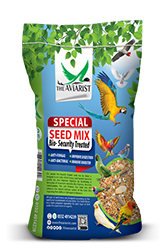
Special Seed Mix
Unlike ordinary seed mixes, our formula goes beyond just filling the seed cup. Every batch is carefully treated and enhanced to support the overall well-being, breeding performance, and immunity of your Sun Conure.
The Special Seed Mix is our core variant, trusted by many breeders. What makes it unique is that, it is regularly adjusted and upgraded according to seasonal changes and breeding requirements.
Tailored nutrition for breeder pairs
Adjusted fat and protein ratios for better breeding outcomes
Ensures strong fertility, better hatch rates, and healthier chicks
This mix is especially beneficial during pre-breeding and general breeding periods.
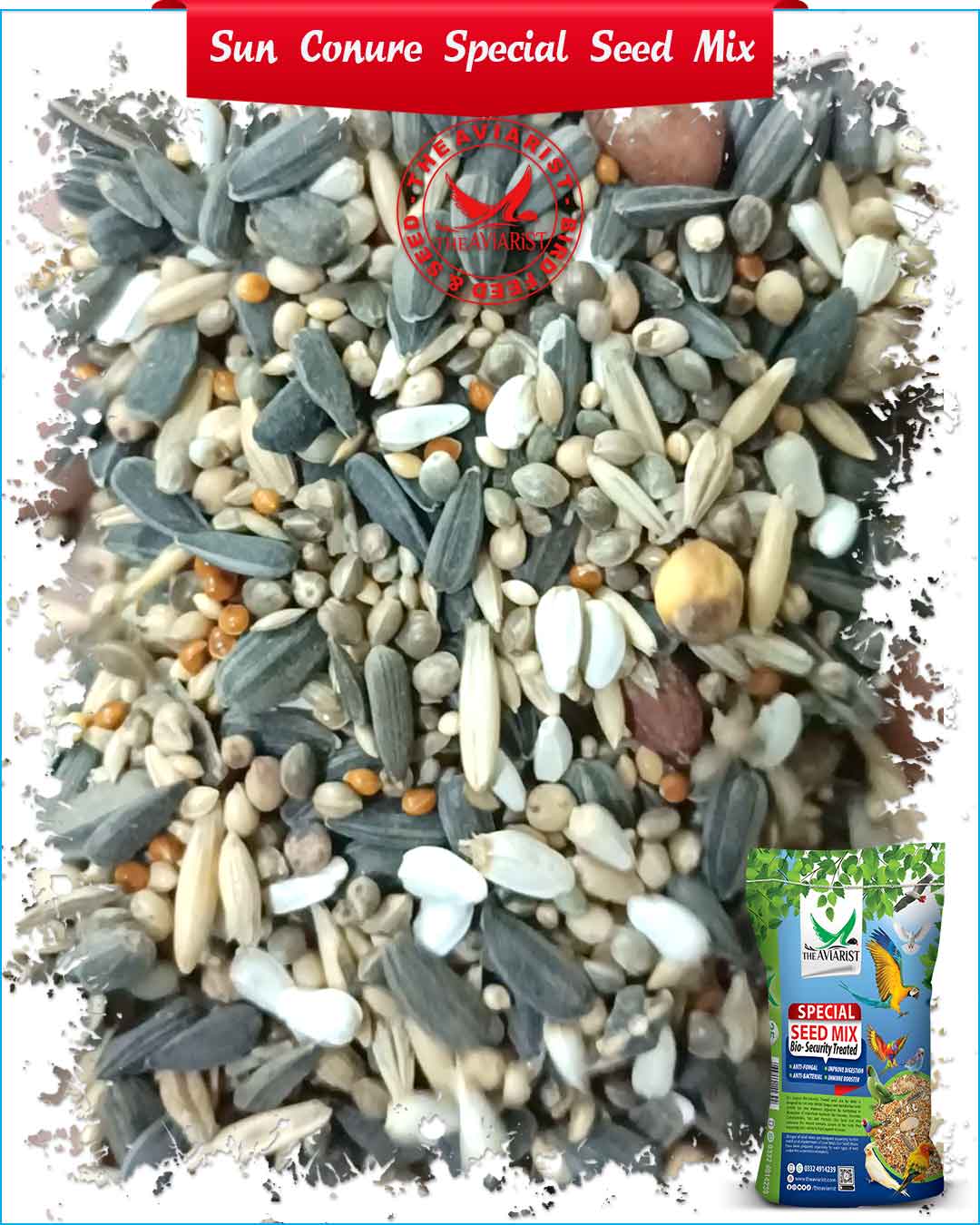
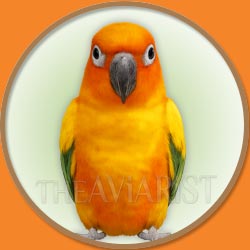
Key Ingredients:
| Ingredient | اجزاء |
| PROSO MILLET | سفید چینا |
| RED PROSO MILLET | لال چینا |
| CANARI SEED | کنیری |
| PEARL MILLET | باجرہ |
| HEMP SEED | بھنگ کے بیج |
| SUNFLOWER SEED | سورج مکھی |
| SAFFLOWER SEED | قرتم |
| OAT SEED | (جوی (جئی |
| BARLEY SEED | جوء |
| WHITE SORGHUM | جوارسفید |
| STRIPED SUNFLOWER SEED | ایرانی سورج مکھی |
| PEANUT KERNAL | مونگ پھلی دانہ |
| ROASTED CHICKPEAS | بھنے ہوئے چنے |
Price Rs.280/Kg
Available in 10Kg & 25Kg Packing
Key Features
1. Bio-Security Treated Seeds
Every seed in our mix undergoes a strict bio-security process. This includes anti-fungal treatment that prevents the growth of harmful fungi such as Aspergillus, which can cause serious respiratory infections in birds. Additionally, the mix is treated to eliminate bad bacteria that often grow in untreated seeds and may lead to digestive or immune-related health problems.
2. Enhanced Digestion
Birds have a delicate digestive system that can sometimes struggle with raw seeds when kept in controled environment. To address this, our seed mix is enriched with special enzymes that aid in the breakdown and absorption of nutrients. These enzymes improve gut health, reduce digestive stress, and maximize nutrient utilization, ensuring that birds get the most from every seed they consume.
3. Immunity-Boosting Formula
A strong immune system is essential for protecting birds against common infections. Our blend is fortified with immunity-enhancing agents that help strengthen their natural defenses. This means your birds are better equipped to fight off seasonal illnesses, bacterial challenges, and environmental stressors.
4. Species-Specific Nutrition
Unlike generic bird seed blends, The Aviarist seed mix is specially crafted for species specific, keeping their natural habitat and dietary patterns in mind. The selected seeds provide the right balance of proteins, healthy fats, vitamins, and minerals that match their natural dietary needs.
Benefits
Healthier Plumage & Brighter Colors
Proper nutrition enhances feather quality, resulting in shinier, stronger, and more vibrant plumage—a sign of a healthy bird.
Boosted Energy & Vitality
With a balanced nutritional profile, birds remain more active, playful, and energetic, reflecting their natural behavior.
Stronger Immunity Against Diseases
The immunity boosting shield protect birds from bacterial and viral threats.
Improved Digestion & Nutrient Absorption
The added enzymes prevent bloating, indigestion, and seed waste, ensuring maximum nutritional benefit.
Longevity & Quality of Life
A safe and nutrient-rich diet contributes to a longer, healthier, and happier life for birds.
Breeding Benefits
Bird breeding requires an optimal diet rich in energy, proteins, and essential micronutrients. The Aviarist Seed Mix is designed to support the breeding cycle in several ways:
Enhanced Fertility in Pairs
Nutrient-rich seeds, combined with immune-boosting agents, improve fertility rates and increase the chances of successful breeding.
Stronger Egg Production
The bio-secure and enzyme-treated formula ensures the hen’s body efficiently absorbs calcium and proteins, leading to stronger, healthier eggs with better hatchability.
Healthy Chick Growth
Parents fed on this seed mix pass on enhanced nutrition to their chicks, ensuring stronger immunity, better feather growth, and healthy development from the very first days.
Reduced Breeding Stress
With improved digestion and higher energy reserves, breeding pairs remain less stressed during mating and chick-rearing, resulting in more consistent breeding success.
Sun Conure
The Vibrant Parrot of Sunshine
The Sun Conure (Aratinga solstitialis) is one of the most vibrant and eye-catching parrot species, native to the tropical forests and savannas of northern South America. Medium in size, it measures about 12 inches (30 cm) in length and weighs around 100–120 grams. Its dazzling plumage is a brilliant mix of bright yellow, orange, red, green, and touches of blue, making it one of the most striking parrots kept in captivity. The combination of fiery colors gives the bird a "sun-like" appearance, which inspired its common name.
A balanced diet of fresh fruits, vegetables, seeds, and protein sources helps maintain their vibrant health and feather quality. With proper care, enrichment, and attention, Sun Conures can live 20–30 years in captivity. Their radiant colors, charming personality, and affectionate nature make them one of the most popular pet parrots worldwide.
Appearance
The Sun Conure is renowned for its brilliantly vibrant plumage, making it one of the most visually striking parrots in the world. Medium-sized at about 12 inches (30 cm) in length and weighing 100–120 grams, it has a slender body with graceful wings and a medium-length tail. The bird’s feathers showcase a radiant blend of golden-yellow and orange-red across the head, breast, and belly, giving it a fiery, sun-like glow. Contrasting green on the wings and blue on the flight feathers and tail further enhance its beauty.
Juvenile Sun Conures are mostly green with hints of yellow, gradually developing their full vivid coloration as they mature, typically around 12–18 months of age. Their dark beak, white eye-rings, and expressive black eyes provide a striking contrast to their colorful feathers. This combination of intense hues and graceful build makes the Sun Conure one of the most admired and recognizable parrot species kept as a pet.
Personalityand Behavior
Sun Conures are known for their affectionate and engaging personalities. They are intelligent, inquisitive, and often described as “clowns” of the parrot world due to their playful antics. These parrots enjoy learning tricks, playing with toys, and being involved in family activities. Their loyalty and ability to form strong bonds make them excellent companions.
However, Sun Conures are also known for their loud calls. They use vocalizations to communicate, and while this makes them great watch birds, it also means they may not be ideal for very quiet households.
Care and Diet
Caring for a Sun Conure requires commitment to both diet and stimulation. A balanced diet should include high-quality seed mixes, pellets, fresh fruits, leafy greens, and vegetables to maintain their health and vibrant colors. Providing enrichment such as chew toys, climbing perches, and plenty of out-of-cage exercise is essential to prevent boredom and ensure mental wellbeing.
They are highly social birds and require consistent interaction. Without sufficient attention, they may become restless or develop behavioral issues. With proper care, Sun Conures can live 20–30 years, offering decades of companionship.
Why Choose a Sun Conure?
Sun Conures are perfect for bird lovers seeking a vibrant, intelligent, and affectionate companion. Their radiant plumage, playful energy, and strong bonding instincts make them one of the most beloved parrot species worldwide. For dedicated owners, a Sun Conure is not just a pet—it is a loyal, joyful, and colorful family member.
Sun Conures (*Aratinga solstitialis*) are active, medium-sized parrots with high energy demands, bright plumage, and a long lifespan. Their nutritional requirements are slightly higher than cockatiels and lovebirds, especially for proteins and fats, since they are playful, energetic, and strong flyers. Here’s a breakdown of the nutritional values needed to maintain their good health:
Nutritional Requirements
Sun Conures have specific nutritional needs that differ slightly from smaller parrots like budgies and lovebirds, mainly because of their medium size, longer lifespan, and breeding capacity. Below is a detailed breakdown of the nutritional values required for maintaining their good health:
Macronutrients
Protein
- Maintenance (pet/companion): 14–16% of diet.
- Breeding pairs & chick-rearing: 18–20% (higher for fertility and chick growth).
- Molting season: 16–18% for feather regrowth.
Fat
- General health: 6–10% of diet.
- Active/breeding birds: Up to 12% (energy demanding periods).
- Pet birds indoors: Keep closer to 6–7% to avoid obesity.
Carbohydrates & Fiber
- 50–55% of diet. Supplies steady energy and aids digestion.
Vitamins
- Vitamin A: Essential for bright feathers, eyesight, and immunity (carrots, sweet potatoes, leafy greens).
- Vitamin D3: Helps calcium absorption and bone/eggshell strength (sunlight or supplements).
- Vitamin E: Supports fertility and cell protection.
- Vitamin K: Important for blood clotting and bone development.
- B-Complex Vitamins: Aid metabolism, feather quality, and nervous system health.
Minerals
- Calcium: 1–1.5% of diet (increased during breeding).
- Phosphorus: Balanced with calcium for strong bones and eggshells.
- Magnesium, Zinc, Iodine, Selenium, Iron: Trace minerals important for metabolism, immunity, and fertility.
- Cuttlebone/mineral blocks: Should always be available.
Breeding Season Requirement
- Protein: Increase to 18–20% for egg-laying hens and chick feeding.
- Fats: Allow 8–12% for energy-rich diets.
- Vitamin A & D3: Must be boosted to ensure healthy chicks and strong eggshells.
- Soft foods (sprouted seeds, egg food, veggies, fruits): Should be included daily.
Water
Fresh, clean water must always be available. Even mild dehydration causes stress, poor digestion, and reduced breeding performance.
Breeding Care
Breeding Sun Conures requires attentive preparation, proper housing, and nutritional support to ensure successful clutches and healthy offspring. Only mature pairs aged 2 years or older should be selected, as younger birds may not breed reliably. Pairs should be well-bonded and housed in a spacious aviary or large cage that allows free movement and natural bonding behaviors. A sturdy nesting box (approximately 12” x 12” x 14”) lined with clean wood shavings provides a safe and comfortable environment for egg-laying.
Nutrition is a critical factor during the breeding season. A balanced diet with 18–22% protein, calcium supplements, and fresh vegetables supports fertility, strong eggshells, and chick growth. Foods such as sprouts, legumes, boiled eggs, leafy greens, and cuttlebone should be included alongside high-quality pellets.
The female typically lays 3–5 eggs per clutch, and incubation lasts 23–27 days, with both parents participating. After hatching, the chicks are fed by the parents with regurgitated food, so it is important to provide soft, protein-rich foods such as soaked seeds, sprouts, and egg food to support chick development. Regular monitoring ensures the chicks are growing well, and hand-feeding may be required if the parents neglect them.
Maintaining a calm, hygienic, and stress-free environment is essential throughout the breeding process to avoid aggression or breeding failures. With proper care, Sun Conures can produce strong, healthy chicks, making them both rewarding for aviculturists and commercially valuable due to their popularity and striking appearance.
1. Pre-Breeding Preparation
- Select healthy, bonded pairs that are at least 2 years old .
- Conduct health checks to rule out diseases and parasites.
- Provide a large cage or aviary (minimum 36” x 24” x 24”) with space for flight and bonding behavior.
- Begin a conditioning diet before breeding: high-quality pellets, fresh vegetables, fruits, sprouts, legumes, and calcium sources (cuttlebone, mineral blocks).
2. Nesting Setup
- Install a wooden nest box measuring about 12” x 12” x 14” , with a concave floor to prevent egg rolling.
- Line the box with clean wood shavings or untreated sawdust .
- Place the box in a quiet, low-disturbance area of the aviary.
- Maintain proper lighting and stable temperature (ideal: 22–28°C ) to encourage breeding.
3. Egg Laying and Incubation
- The female typically lays 3–5 eggs per clutch .
- Incubation lasts 23–27 days , shared mostly by the female, while the male provides food and protection.
- Provide calcium-rich and protein-rich foods (dark leafy greens, broccoli, sprouts, boiled egg) to support egg production and fertility.
- Limit disturbances to reduce stress during incubation.
4. Chick Rearing
- Once chicks hatch, parents feed them with regurgitated food.
- Supplement parents’ diet with soft, high-protein foods such as soaked seeds, sprouts, legumes, and egg food.
- Monitor chicks regularly to ensure they are being fed well.
- If parents neglect or underfeed, be prepared for hand-feeding with a specialized formula.
- Keep the nesting box clean, dry, and hygienic to prevent infections.
5. Post-Breeding Care
- Chicks are usually weaned by 8–10 weeks and can then be placed in a separate cage for socialization.
- Allow breeding pairs a resting period between clutches to maintain their health.
- Continue a balanced diet with pellets, vegetables, and supplements.
- Provide enrichment toys and perches to keep adults mentally stimulated during the recovery phase.
With attentive management, Sun Conures can successfully produce healthy offspring. Their brilliant colors, affectionate nature, and strong market demand make breeding both rewarding for hobbyists and profitable for aviculturists.
Commercial Breeding of Sun Conure
Breeding Sun Conures holds strong commercial importance due to their vibrant appearance, affectionate personality, and global popularity as pets. Their brilliant mix of yellow, orange, red, green, and blue plumage makes them one of the most visually striking parrots, which greatly increases their market value compared to many other medium-sized parrots.
In aviculture, Sun Conures are productive breeders, typically laying 3–5 eggs per clutch with an incubation period of around 23–27 days. With proper care, pairs can produce multiple clutches per year, ensuring a consistent supply for the pet trade. Their long lifespan (20–30 years) and strong adaptability further boost their appeal among bird enthusiasts.
From a commercial perspective, Sun Conures command higher prices in the market because of their rarity, beauty, and demand. They are especially valued in regions where exotic and brightly colored parrots are sought after as status symbols and companion pets. Breeders who maintain quality nutrition, proper care, and biosecurity standards can build a profitable and sustainable business, as well-socialized Sun Conures are always in demand.
Why The Aviarist Seed Mix?
To maintain good health, Sun Conures require a diet with 14–16% protein (up to 20% in breeding), 6–10% fat (up to 12% in active breeders), along with essential vitamins, minerals, and fresh water. With their high energy lifestyle, Sun Conures thrive on a safe, enriched, and balanced diet such as The Aviarist- seed mix, which ensures vitality, fertility and stunning plumage year round.
